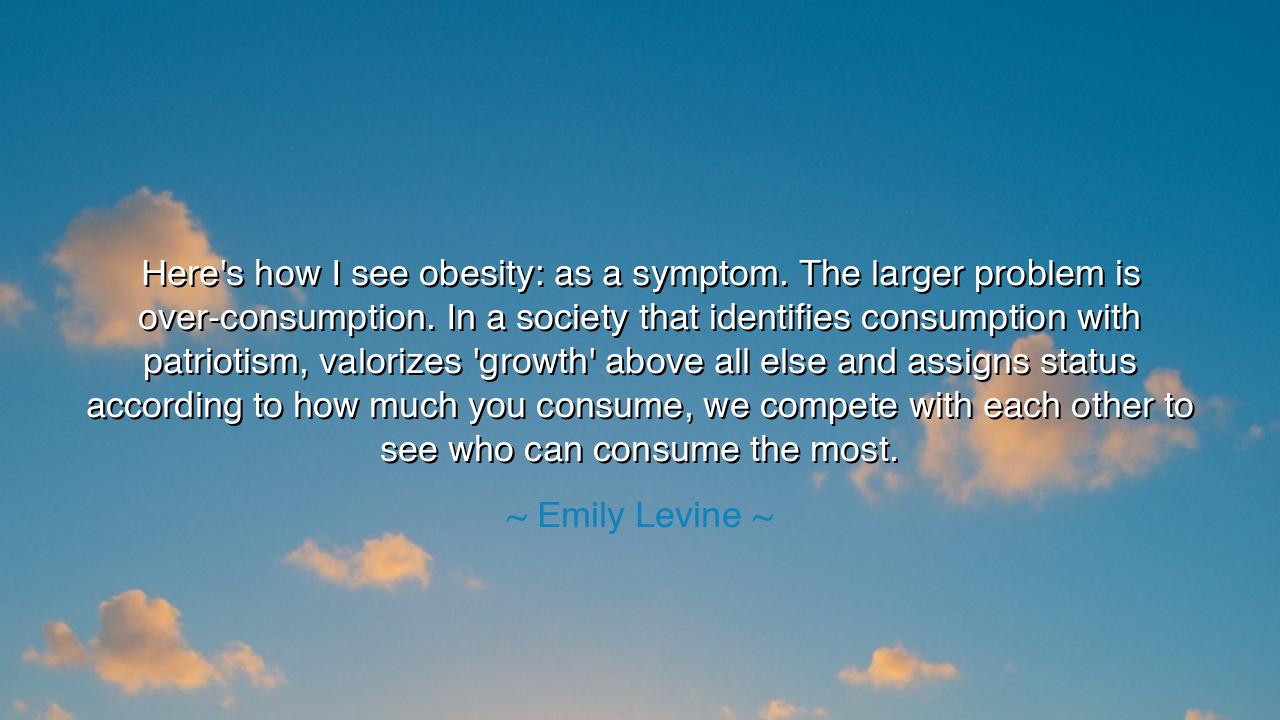
Here's how I see obesity: as a symptom. The larger problem is
Here's how I see obesity: as a symptom. The larger problem is over-consumption. In a society that identifies consumption with patriotism, valorizes 'growth' above all else and assigns status according to how much you consume, we compete with each other to see who can consume the most.






The thinker and satirist Emily Levine once spoke with piercing insight: “Here's how I see obesity: as a symptom. The larger problem is over-consumption. In a society that identifies consumption with patriotism, valorizes 'growth' above all else and assigns status according to how much you consume, we compete with each other to see who can consume the most.” In these words lies a mirror of our civilization, reflecting not merely physical habits but the spiritual and moral consequences of a society obsessed with excess. Levine draws a line between the visible—obesity—and the hidden—the cultural idolization of consumption itself.
The ancients often taught that balance is the mark of virtue, and excess is the pathway to decay. Levine reminds us that when a society equates growth with greatness, and consumption with honor or patriotism, the measure of a person becomes external rather than internal. Wealth, material possessions, and the capacity to acquire are elevated above wisdom, compassion, and integrity. In such a system, the body is only one arena where excess manifests, but the mind, the soul, and the community are equally at risk. Obesity, in her view, is not the primary illness—it is a symptom of a culture overfed on illusion and appetite.
History offers cautionary tales. Consider the fall of Rome, a civilization that celebrated abundance and conquest above moderation. Banquets, luxury, and indulgence were symbols of status, and excess became a national pastime. While soldiers and citizens alike competed to display wealth and appetite, the moral and structural foundations of society eroded. Rome’s collapse was not caused by gluttony alone, but by the cultural elevation of over-consumption above prudence, duty, and communal responsibility. Levine’s words echo this ancient truth: the obsession with growth and acquisition blinds a society to its deeper needs.
Levine also speaks to the paradox of patriotism in modern society. To consume is to assert one’s place, to demonstrate loyalty to national ideals of production and progress. Yet when consumption becomes a measure of virtue, the moral compass is warped. True patriotism, the ancients would argue, is not measured in possessions or the capacity to acquire, but in service, integrity, and care for others. When societies honor gluttony and greed as symbols of success, they encourage rivalry not in courage or wisdom, but in accumulation—a competition that diminishes both the self and the collective.
Consider the example of the early 20th century in America, during the Roaring Twenties. Economic growth surged, and prosperity was celebrated with lavish spending, luxury automobiles, and opulent homes. People competed not only for wealth, but for visibility, status, and influence through acquisition. Yet, this era of exuberant consumption collapsed into the Great Depression, revealing that a culture that equates worth with acquisition is brittle and unsustainable. Levine’s observation serves as a modern echo of this lesson: over-consumption is a symptom of deeper societal imbalance, and the consequences are felt physically, socially, and morally.
The meaning of her quote is clear: to confront the visible problem of obesity, one must confront the invisible problem of societal values. Individual health cannot be separated from cultural health. When growth, consumption, and material status dominate the imagination, personal and collective well-being are compromised. Levine’s insight invites a broader reflection: moderation, wisdom, and moral clarity must guide both personal habits and societal structures.
The lesson for all generations is profound: do not measure yourself or others by the abundance of possessions, nor equate consumption with worth or loyalty. Seek balance in all things—body, mind, and society. Recognize that over-consumption is a cultural as well as personal problem, and that visible consequences, like obesity, are but symptoms of a deeper misalignment of values.
Practically, this calls for mindfulness in both action and judgment. Consume with intention, invest in experiences rather than mere objects, honor community over competition, and cultivate habits that sustain both the self and the collective. Reduce excess, embrace moderation, and seek fulfillment in service, knowledge, and virtue. In doing so, the nation and the individual may rise above the corrosive worship of accumulation and rediscover the enduring strength of balance, wisdom, and shared humanity.






AAdministratorAdministrator
Welcome, honored guests. Please leave a comment, we will respond soon